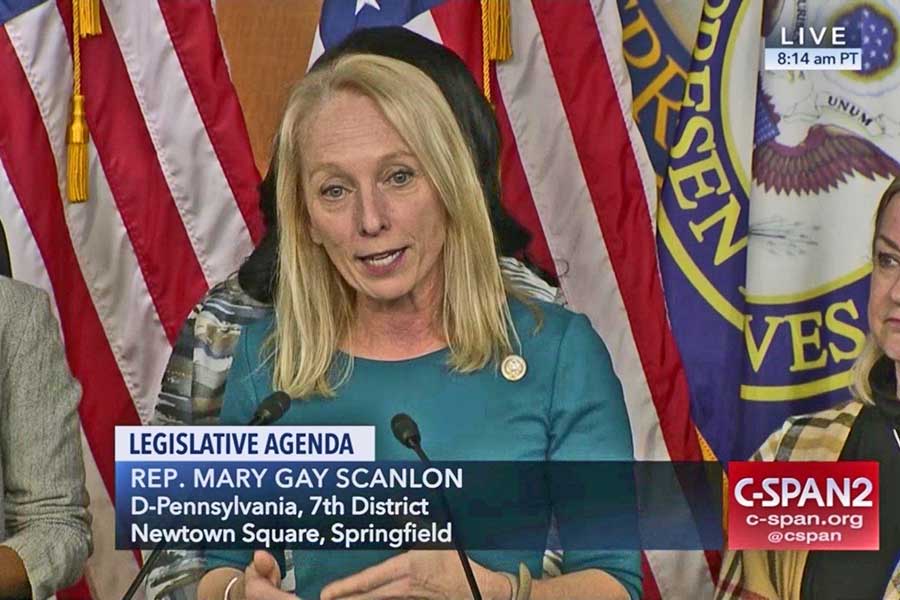U.S. Rep. Mary Gay Scanlon fulfilled the promises she made while campaigning to fight for LGBTQ equality: She recently joined the Congressional LGBT Equality Caucus and signed on as a cosponsor of the Equality Act — moves that have local LGBTQ-rights advocates looking to other elected officials to make good on their promises.
Scanlon, a Democrat, was sworn into office to represent Pennsylvania’s Seventh Congressional District on Nov. 13, filling the vacancy created by the resignation of Rep. Pat Meehan over a sexual-harassment scandal. Scanlon will be sworn in as the member representing Pennsylvania’s Fifth District on Jan. 3. The change in district is the result of a state Supreme Court ruling requiring Pennsylvania to redraw its congressional map. The new Fifth District, which encompasses Delaware County, is comprised of parts of the former First, Second and Seventh districts.
“Now more than ever, allies must stand strong with the community,” Scanlon said in a statement released Dec. 13. “Members of the LGBTQ community deserve the same rights, protections, and opportunities as any other American. While the fight for equality has seen rapid progress in the past decade, we are still a long way from full legal and social equality for LGBTQ people.”
Adrian Shanker, executive director of the Bradbury-Sullivan LGBT Community Center in Allentown, said Scanlon’s push to “fight for [the LGBTQ community] in Washington” is crucial, but that he would like to see “more members of Congress who are from Pennsylvania join the Equality Caucus.”
Shanker questioned whether other candidates who were successful in November’s election will take action in supporting the LGBTQ community.
“Pennsylvania needs more representation in the caucus, especially from those who ran on pro-LGBT initiatives during their campaigns,” Shanker said. “It reminds people here in Pennsylvania that we still have work to do to pass our own extension of laws here in the state through the passage of the Fairness Act.”
Scanlon said in the statement that she is strongly committed to fighting “for the passage of the Equality Act” as a co-sponsor. The Equality Act, which was introduced in the U.S. House of Representatives in 2015, amends the Civil Rights Act of 1964 to prohibit discrimination on the basis of sexual orientation or gender identity in regard to employment, housing, credit, education, public spaces and services, federally funded programs and jury service.
Alexander Olson, co-chair of Philadelphia’s Liberty City LGBT Democratic Club, said Scanlon’s move to join the caucus is “an example of a candidate that’s following through with the initiatives and platforms that they talked about before the election. I’m looking for more elected officials who have made similar promises to the community to align their actions with their words.”
Along with Scanlon, the caucus currently has 115 members (113 Democrats and two Republicans) who serve as a resource for Congress at large, their staff and the public on LGBT issues at the federal level. The mission of the caucus is to “work toward the extension of equal rights, the repeal of discriminatory laws, the elimination of hate-motivated violence and the improved health and well-being for all, regardless of sexual orientation or gender identity and expression.”
David Stacy, director of governmental affairs at the Human Rights Campaign, told PGN that Scanlon will be an “important addition” to the Equality Caucus.
“HRC was proud to help elect Scanlon in her bid to represent the people of Pennsylvania’s Fifth Congressional District. From her efforts to support marriage equality to her work helping to make workplaces more trans-inclusive, she has long been a champion of equality in Pennsylvania and across the country,” Stacy said.
Scanlon also joined the Transgender Equality Task Force within the Equality Caucus. The task force’s key priorities include public safety and eliminating violence against the trans community, as well as healthcare access, addressing inequality and school environments for trans students.
“I have been proud to represent transgender litigants fighting for civil rights and I will continue this fight in Congress,” Scanlon said. “To my transgender constituents, I want you to know: We see you, we value you, and we will fight for your rights in Congress.”

